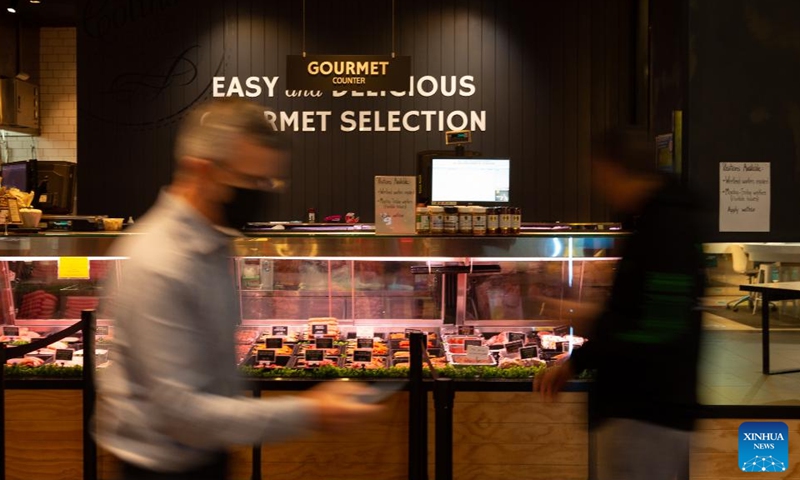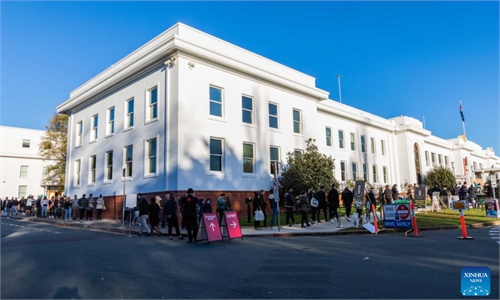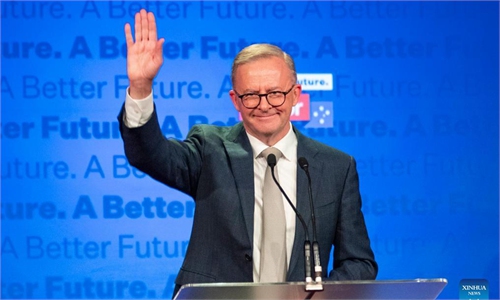Australian firms pin hopes on new Albanese government for recovered ties with China
Experts urge govt to reassess relations with Beijing

People shop at a supermarket in Sydney, Australia, on April 7, 2022.Photo:Xinhua
Australian businesses are seeking closer trade and economic ties with China, their largest market and the one with the largest potential, as they hope for better times and more normal relations under the administration of Anthony Albanese, who has become the new prime minister of Australia.
Bilateral business and trade activities have been disrupted for a long time, as a result of the Morrison government's hostile policy toward China, and businesses are eager for a turnaround. Meanwhile, a key Australian business chamber has called for improved relations in its latest survey of members in China.
At a regular press conference on Monday, Chinese Foreign Ministry spokesperson Wang Wenbin congratulated Albanese on winning the election, while extending expectations for a healthy and stable bilateral relationship.
The healthy and stable development of China-Australia ties is in line with the fundamental interests and common aspirations of the two peoples, and is also conducive to peace, stability and prosperity in the Asia-Pacific region, Wang said.

Graphic: GT
The business community is hoping for change, as the bilateral relationship fell to its lowest point under Morrison's leadership.
"We must see regular high-level dialogue re-established. This is where, as a business community, we would urge both governments to take advantage of this opportunity to work far more closely than we have seen in recent years," Nick Coyle, CEO of China-Australia Chamber of Commerce (AustCham China), told the Global Times, speaking about expectations among AustCham members for the improvement of bilateral relations under the new Australian government.
AustCham is finalizing "Doing Business in China" report, and one of the report's messages is the dissatisfaction with how bilateral relations have been managed in last years, according to Coyle, while noting that "there is also a clear willingness from businesses to engage with China and belief in the two-way economic opportunities."
Australian goods that rely heavily on the Chinese market sustained heavy blows as bilateral relations weakened and market preferences diversified.
For example, China's imports of Australian coal, both coking and thermal, dropped from 10.93 million tons in July 2020 to only 108,000 tons in January 2021, and the figure has since remained at nominal levels, data compiled by commodity analysts Kpler showed.
Businesses are hoping to get closer to the Chinese market to make up for their losses while securing growth.
A source at Australian wine company Treasury Wine Estates, one of the world's largest wine companies, told the Global Times that the company plans to launch its first "made-in-China" vintage in the domestic market in the second half of the year.
Huo Xingsan of the China Alcoholic Drinks Association was not surprised by this move, which he described as part of a growing trend of foreign investment in the booming domestic industry and market.
This is yet another piece of evidence to show that Chinese-made wine meets world standards, and so do China's vintages in areas such as Ningxia, Huo told the Global Times on Monday.
The industry insider noted that the Chinese wine market has huge potential, and international brands including those from Australia don't want to pass this up.
There is a general expectation among Australian firms that bilateral ties will get back on track.
Talking about the prospects of China-Australia trade and economic relations under Albanese, Coyle noted that the prospects are rosy, given the fundamental drivers of the trade and investment relationship.
"There is of course that highly developed complementarity as a business community we often speak of. Labor's enhanced emphasis on climate change and shifting Australia to a lower carbon footprint should, as we have been saying for some time, represent a good opportunity for Chinese and Australian business to collaborate," Coyle said.
Since the Albanese government has just taken office, the top of his agenda is apparently the domestic economy, and diplomacy is not yet a priority, Chen Hong, president of the Chinese Association of Australian Studies and director of the Australian Studies Centre at East China Normal University, told the Global Times on Monday.
However, experts noted that it is important for the new government to reassess Australia's relationship with China.
Albanese on Monday said the country's relationship with China would remain "a difficult one", and that "it is China that has changed, not Australia."
Chen said that Albanese's remark is an example of Canberra's repeated rhetoric.
"What he needs to understand is that China is indeed changing, and it has been changing positively.
"Bilateral trade jumped from less than $100 million at the beginning of diplomatic relations in 1972 to $230 billion in 2021, with China now Australia's largest trading partner. Doesn't he think this change is positive and proactive?" Chen said.



